|
|
Reviewed by Glenn Erickson
Yes, yes, this is an old-school Bible film. But it's also where the theme and imagery for the 'Holy Death Ray' finale of Steven Spielberg's Raiders of the Lost Ark came from. And the whole thing looks incredibly good in a beautiful scan made directly from the 8-perf Super Technirama elements.
High-quality Biblical spectacles peaked in 1960 with Nicholas Ray's King of Kings, Henry Koster's The Story of Ruth and (a year later) Michael Curtiz's Francis of Assissi and Richard Fleischer's Barabbas. If by then the form had run out of steam, it was surely overkill -- in 1959 there had been the big winner Ben-Hur, The Big Fisherman and the lavish United Artists spectacle Solomon and Sheba, none of which lost money. Whether filmed in Italy, Spain or the San Fernando Valley, for a while audiences couldn't get enough of big films, often in giant-screen formats, that built on the critic-proof Bible formula so profitably tapped by Cecil B. DeMille. The subgenre was eventually killed off, not by Kirk Douglas's secular epic Spartacus but by the horde of copycat sword 'n' toga 'epics' coming out of Italy. After several doses of Sons of Hercules, the audience saw anything from ancient Greece or Rome as an excuse for bleary color and horrendous dubbed voices. Ray Harryhausen's superior fantasy Jason and the Argonauts suffered amid the onslaught of inferior product.
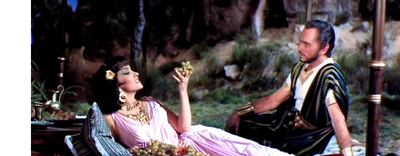
Solomon and Sheba is a solid class-act effort made before the genre hit the downgrade slope. Even with its unfortunate production history -- its star died mid-film and much of the movie had to be re-shot with a replacement -- it is a quality product on every level. It's as devout and essentially humorless as DeMille, but without the unintended idiocy that has made The Ten Commandments something of a bad joke. Not as lavish or clever as the bigger pictures, it nevertheless has integrity, and its missteps are not crippling. It was the great King Vidor's last feature film, in general not directed as smartly as his earlier pictures. But the story is a good one, and a couple of 'miracle' moments work rather well. That's a lot to be said for a genre that frequently risks dismal lapses of good taste in the name of 'good Christian entertainment.'
The great King David, of David & Goliath fame (Finlay Curie), is dying. His sons the poet Solomon (Yul Brynner) and the warrior Adonijah (George Sanders) are recalled to Jerusalem from guard duty on the Egyptian border. Solomon has no ambition to rule but accepts his father's dying decision that he should take over the leadership of Israel. The virtuous Solomon is wise and can keep his own counsel, and he has a spiritual conscience in the person of Abishag (Marisa Pavan), the daughter of one of Israel's chieftains. The jealous and spiteful Adonijah wastes no time plotting against Solomon. When his henchman Joab (John Crawford) fails in a coup attempt, Adonijah is banished. But Solomon's defenses don't prepare him as well for his next challenge. In exchange for control of a port city, Queen Sheba of the land of Sheba (?) (Gina Lollbrigida) promises Pharaoh (David Farrar of Black Narcissus) to seduce Solomon and find his weaknesses. Welcomed to Jerusalem, Sheba falls in love with her host and vice-versa. She takes a liking to Solomon's fair rule and sense of justice, while Solomon is carried off by lust (and his own songs, I suppose), He becomes interested in Sheba's pagan rituals enough to sponsor one, but the God Jehovah expresses his displeasure by destroying the massive temple Solomon has built. The scandal sows dissent among the tribes and gives the banished Adonijah an opening. Selling out his country to secure himself a crown, Adonijah tells Pharoah that Sheba has defected to the Israelites. He offers to lead Egypt's army against Solomon's now-divided forces.
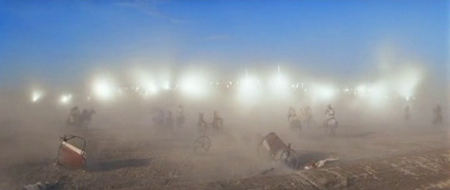
Solomon and Sheba is a good story with Old Testament miracles and the kind of massed desert battles that audiences were going for in the late '50s. We seemed intimidated every time a screen was filled with hundreds of costumed extras, and this show isn't get stingy with the horses, chariots, helmeted warriors and spear-carrying... spear carriers. What's more, it has an action scene that effectively mixes live-action, special effects and an impressive battlefield miracle, sort of a Charge of the Light Brigade meets the Grand Canyon. The clever aspect of this is that the 'inspired' battlefield maneuver is halfway believable.
But at least 70% of the film is talk, some of it the actual spoken words of The Lord. The tone is serious enough not to feel sacrilegious. Yul Brynner makes for a solid Solomon, even if he sometimes seems like the King of The King and I wearing a (very good) toupee. Scene after scene sees Solomon staring into the middle distance, unhappy about his rotten brother, his own lust for the Queen, or the guilty knowledge of how sorely he's let down his own people. The film at times follows Sunday School basics, as when Solomon dispenses justice with the instruction to divide in half a baby claimed by two women. Frankly, I say any king who risks a baby being hurt by an accident can't be the wisest man in town. When Solomon is necking with his pagan lady-love and singing his love verses, he's okay. Elsewhere the hard-faced Yul Brynner begins to look like Herbert Lom with bigger muscles. The men have very similar faces.
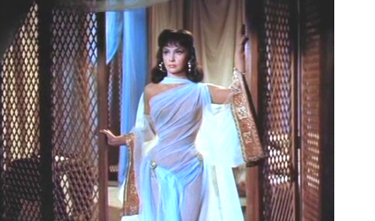
Gina Lollobrigida would seem a natural for Sheba. The actress surely had a tough haul to stardom in the impoverished postwar years in Italy. By her heavy Italian accent I'd judge the pagan land of Sheba to be just north of Milan. Gina is graced with a wardrobe by Fredericks of Babylon but also eye makeup that now seems wholly unattractive, and thesping was never her strongest suit. In sort of a throwback to MGM's laughable Lana Turner Bible-rama movie The Prodigal, Sheba's 'pagan ritual' party turns out to be a chaste orgy where people hug and flail their arms about. Gina dances on a fairly lame set, compared to the sumptuousness of the rest of the film. We assume that Sheba became pregnant by Solomon at an earlier date, perhaps in a boat under the trees when he's singing those beautiful songs.
Solomon and Sheba is most noted for the death of its first leading star, Tyrone Power, in mid-shoot. We're told that Power can still be spotted in long shots in the battle scenes. Rather than go into that story, the facts are laid out fairly straightforwardly at the film's Wiki page. For the curious, there's also a YouTube address with stills and footage of the actor's unused work.
I'm more interested in the screenwriter's adaptation of the original Bible story -- which reportedly does not mention a Sheba-Egypt alliance against Israel, nor a romantic relationship between the Queen and Solomon. If we're to take the story as a political analogy, I suppose its main message is that Israel needs to be united against its enemies, and not led by a despotic militarist. But I don't know of any Israeli faction in 1958 that would betray its country as does Sanders' Adonijah. Speaking of Adonija, that crazy guy is an object lesson in not counting chickens before they've hatched. Twice he assumes battles have been won and his crown secured, and flat-out fails to finish the job. I wish all our enemies were so foolishly impatient.
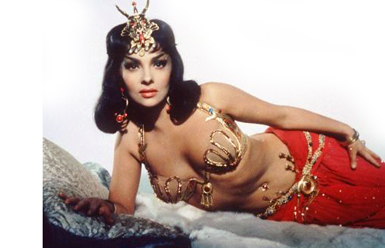
The Jehovah who speaks out loud in this screenplay is a particularly cruel god. To punish Solomon for his pagan sex blasphemy, he blasts the temple with lightning bolts. What seems perversely unfair is that the innocent Abishag (Pavan) is the one to pay the penalty for Solomon's sins. After all her pagan sinning, the temptress Sheba only has to accept Jehovah and promise to convert her people, and she gets a free pass: Jehovah heals her wounds, and possibly resurrects her as well. The interesting thing about Solomon's last-minute battlefield victory is that it isn't a miracle. It's obviously designed to echo DeMille's Red Sea miracle, but Solomon comes up with it of his own accord, without Jehovah's aid. 1
Today's audience will definitely relate to a particular item sealed up in Solomon's Temple -- the one and only Ark of the Covenant, a golden box looking exactly like the prop fashioned for Steven Spielberg's 1981 Raiders of the Lost Ark. It's not flattering that our cultural awareness of the Bible should now be dominated by an image from a pulp fantasy about archeologists and Nazis. But I have to admit that, when the Ark is revealed here, it generates a bit of a jolt. We only wish that Adonijah or Joab or some other sub-villain would take a peek inside, and be incinerated in a flash of heavenly fire. You know, like the dumbbell faux-Pandora Lily Carver.
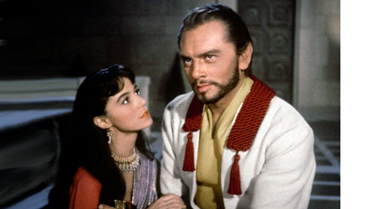
The Spanish locations are beautiful, and even though King Vidor's direction has few if any dramatic camera flourishes or unique visuals, all scenes are well laid-out for the camera, especially the wide battle exteriors presumably filmed in Spain. Compensating for the uniformly flat, high-key lighting is the added clarity of the Super Technirama process. Essentially squeezed VistaVision, it looks exceedingly sharp. Unlike CinemaScope, it has a flat field (no visual warping) and a broad depth of focus. Even the optical effects are exemplary -- the blinding glare from all of those Israeli shields looks great.
Yul Brynner stepped in to help rescue Solomon and Sheba on short notice, as a favor to the family of his friend Tyrone Power, who was a part-producer. Ms. Lollobrigida was a participant as well. Genre favorites Laurence Naismith, Jack Gwillim and Harry Andrews all have juicy parts, but the unsung supporting hero award goes to the actor playing George Sanders' main henchman Joab, providing the enthusiasm to balance Sanders' underplaying. A look at John Crawford's re-zoom reveals a lot of good work in smallish parts. But he's sensational in Arthur Penn's 1975 Night Moves, where he plays Tom Iverson, the middle-aged pilot with the big beer gut, shacked up with Jennifer Warren down in the Florida keys. What a great role!

Twilight Time's Blu-ray
of Solomon and Sheba is a beautiful scan of this better than average Biblical epic. I checked into the disc production and, contrary to some talk on web boards, MGM made the HD transfer from a full-format Super Technirama element, a new 8-perf IP created in 2007. It is not derived from a reduction print. On my new 4K monitor I saw no flaws in the transfer at all. I see no need whatsoever to be wary of the quality of TT's transfer. Even the faux-marble background for the main title pops, and the temple and throne rooms in Jerusalem are revealed to be very large sets. They're a little austere, however. You'll more likely remember the polished stone, not any great design.
A two-track stereo mag was used for the audio. I was told that a 4-track might exist, but that it could well be for an alternate, shorter reissue version. Mario Nascimbene's score is okay but seems to be aiming at a grand Miklos Rozsa feel and falling short. There's a lot of wailing voices, as in his music for the later When Dinosaurs Ruled the Earth. His drum-driven music for Sheba's Orgy doesn't do much either - it's neither sufficiently exotic nor sensual, and leaves poor Gina Lollobrigida doing a lot of heavy breathing and torso tossing. The couple of shots of the actress in Carol Reed's Trapeze, posing on a circus rope to the song "Clair de Lune" are far more erotic.
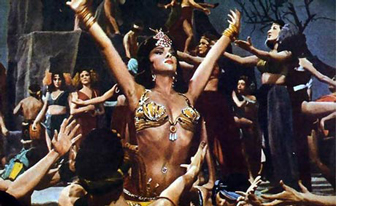
I'm not sure whether Solomon and Sheba was road-shown or not. Two original trailers are included. The one for the 'ordinary' 35mm Technirama release is wild enough, but the earlier trailer for 70mm bookings is a real doozy, no kidding. The Super Technirama 70 logo flies off the screen several times, accompanied by marvelously hyped text blurbs and narration boasts: "The voluptuary of the perfumed bath! Mistress of all the arts of Love!" "Behold -- the many SINS! The Shameless Fertility Rites of Rha-gon!" They just don't make 'em like that any more.
Twilight Time's mistress of all the arts of liner notes Julie Kirgo excels with this one. She explains how the on-set catastrophe extended to director King Vidor as well. Yul Brynner decided to ignore direction and make Solomon yet another of his 'confident men of stern resolve' -- essentially his gunfighter from The Magnificent Seven, taking occasional breaks to sing poetry. Kirgo confirms that the film's 'orgy' scene was indeed promoted as hot stuff in the clammy pop culture world of 1959. In the film, Jehovah's lightning bolts are a swift reprimand to Sheba's come-hither writhing. The moral lesson puts things back in line, as Kirgo reports: "The ultimate message was, basically, hurrah for monotheism!"
On a scale of Excellent, Good, Fair, and Poor,
Solomon and Sheba Blu-ray rates:
Movie: Very Good
Video: Excellent
Sound: Excellent
Supplements: Isolated Music and Effects (M&E) track, two trailers, Julie Kirgo liner notes.
Deaf and Hearing Impaired Friendly?
YES; Subtitles: English
Packaging: Keep case
Reviewed: April 2, 2015
Footnotes:
1. (Spoiler) The scene is beautifully staged and quite effective. Solomon orders his remaining forces to polish their shields, which reflect the light of the rising son at the charging Egyptian hordes. Blinded, every last Egyptian soldier, horse and chariot topples into a deep ravine they don't
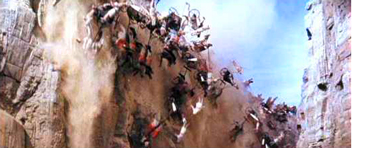 see coming. The model work is obvious but the effects look great anyway.
see coming. The model work is obvious but the effects look great anyway.
The 1963 Yul Brynner movie Taras Bulba repeats this motif when a massive army is forced off a cliff. Thousands of Polish (I think) cavalry plummet to the bottom of a ridiculously deep chasm. Not filmed half as well as in Solomon, the scene must have been hilarious in theaters, with all those dolls and miniatures taking the Big Drop. And no, there's no spider pit at the bottom, to finish off the survivors. "Swim? The fall will kill ya!"
Return

Text © Copyright 2015 Glenn Erickson
See more exclusive reviews on the Savant Main Page.
Reviews on the Savant main site have additional credits information and are often updated and annotated with reader input and graphics.
T'was Ever Thus.
Return to Top of Page
|


